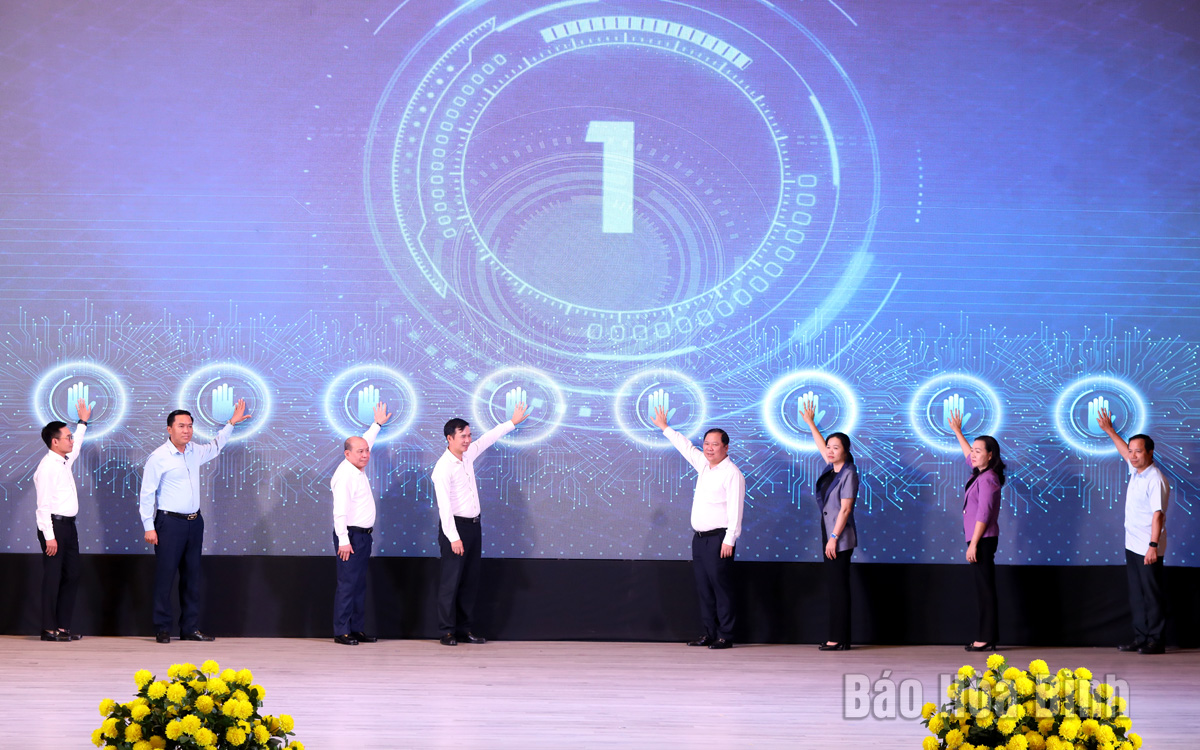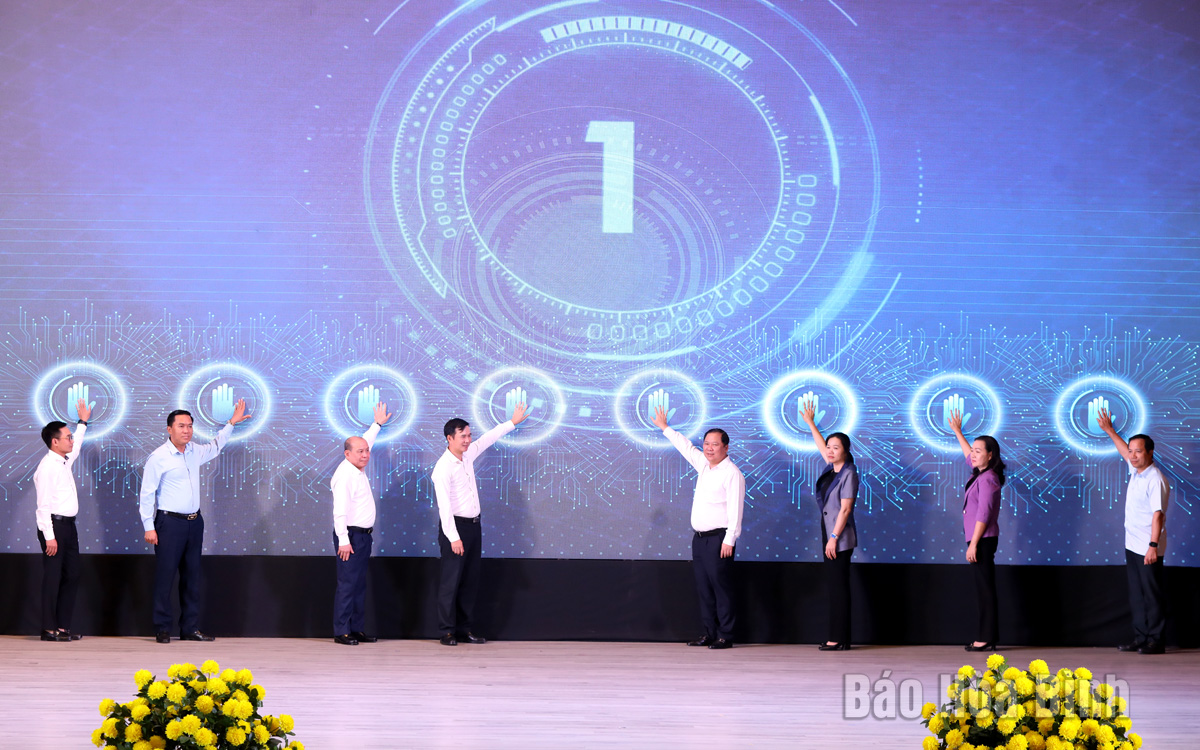
On May 15, the Hoa Binh Steering Committee for Science, Technology, Innovation, and Digital Transformation launched the "Digital Literacy for All” movement. The event was held both in-person and virtually, connecting provincial authorities with district-level Party committees and local communities across communes, wards, and townships.
Central and provincial-level officials
press the buttons to launch the "Digital Literacy for All” movement.
The event drew Bui The Duy, alternate Member of
the Party Central Committee and Deputy Minister of Science and Technology, as
well as senior officials from the National Authority of Digital Transformation.
Delegates at the provincial levels included Nguyen Phi Long, alternate Member
of the Party Central Committee and Secretary of the provincial Party Committee,
Bui Thi Minh, Permanent Deputy Secretary of the provincial Party Committee, and
Bui Duc Hinh, Deputy Secretary of the provincial Party Committee and Chairman
of the provincial People’s Committee.
Also present were provincial department leaders,
National Assembly deputies of Hoa Binh, business representatives, technology
experts, and local students and residents.
Attendees explored an exhibition featuring "Make
in Vietnam” technologies aimed at promoting digital government, economy, and
society. Companies such as VNPT Group, Viettel Group, FPT Corporation,
MobiFone, MISA, MedCAT JSC, Thánh Gióng Media & Computer Company, and Dell
Vietnam showcased technologies contributing to national and local digital
transformation, improving public services, governance, and economic
development.
The event reinforced Hoa Binh’s commitment to
the objectives outlined in Politburo Resolution No. 57-NQ/TW issued on December
22, 2024 by the Politburo on accelerating science, technology, innovation, and
digital transformation. By bringing together government leaders, businesses,
and experts, the festival aimed to ensure digital services are practical and
accessible to all citizens.
In his speech, Nguyen Phi Long, alternate Member
of the Party Central Committee and Secretary of the provincial Party Committee,
emphasised the role of science and technology in economic growth. He
highlighted the province's achievements, such as the 40% Total Factor
Productivity (TFP) in 2024 and the expansion of broadband internet, with 100%
of communes now connected to high-speed fibre-optic networks and 4G coverage
reaching 96% of areas.
Hoa Binh also deployed digital platforms across
all levels of government, improving service efficiency and accessibility. More
than 85% of administrative documents are now submitted online, and the province
consistently ranks in the top 10 for service quality.
Despite progress, Long acknowledged barriers to
digital transformation and stressed the need for continued awareness-raising
and training to make digital tools accessible to everyone, especially
vulnerable groups.
Bui The Duy, Deputy Minister of Science and
Technology, praised Hoa Binh’s implementation of Resolution 57-NQ/TW and
highlighted the importance of digital transformation in the province’s growth.
He noted that as the province continues to restructure and develop its economy,
digital tools will be crucial for progress.
Digital transformation is not about complex
technology but about practical solutions that improve daily life, Duy said,
calling for ongoing engagement from all sectors.
At the event, Hoa Binh’s police introduced the
VNeID app, which simplifies online public services. Youth volunteers, in
collaboration with local police and telecom companies, assisted residents at
Phuong Lam Market in using digital services.
Experts shared solutions for Hoa Binh’s digital
transformation. VNPT presented AI and big data applications for governance and
economic development. MISA showcased a "Make in Vietnam” platform to drive innovation.
FPT demonstrated smart cameras using AI and IoT
for security, while Viettel discussed a proactive e-governance platform for
smarter public services, MobiFone shared AI-driven tools for digital
transformation, and MedCAT introduced a platform to digitise unstructured data.
The Standing Board of the Hoa Binh provincial Party Committee has agreed in principle on a proposal by the Standing Board of the Party Committee of Hoa Binh city to gather feedback on the city’s 1:2000 zoning plan, which forms part of its broader urban development strategy.
Hoa Binh province has made notable progress in public administration reform and digital government development, with the satisfaction index among citizens and businesses reaching over 84%, according to recent government evaluations.
Thanks to great efforts by local authorities in recent times, the governance and public administration performance of Mai Chau district has been significantly improved.
In the afternoon of June 6, the Party Committee, the People's Council, the People's Committee and the Fatherland Front of Lac Son district solemnly held a meeting to celebrate the 139th anniversary of the district's founding (1886–2025) and the 79th anniversary of the establishment of the district's Party Committee (1946–2025). There was the attendance of Mr. Bui Van Thang, the Vice Chairman of the Provincial People's Council; Mr. Quach Tat Liem, the Vice Chairman of the Provincial People's Committee; Ms. Dang Bich Ngoc, the Deputy Head of the National Assembly Delegation of the province; as well as the former leaders of the province and district through various periods, who are the natives of the district.
Implementing the Politburo’s Resolution No. 57-NQ/TW on breakthroughs in science – technology, innovation, and digital transformation is a golden opportunity for the northern mountainous province of Hoa Binh to renew growth model, improve competitive edge and shorten digital gap.
Resolution 57-NQ/TW, issued by the Politburo on December 22, 2024, identifies sci-tech, innovation, and digital transformation as strategic breakthroughs to build a developed and prosperous nation. In Hoa Binh province, this spirit is not just a slogan, it’s being put into action through concrete initiatives that form a "new development triangle”: digital citizenship, digital economy, and digital administration.



